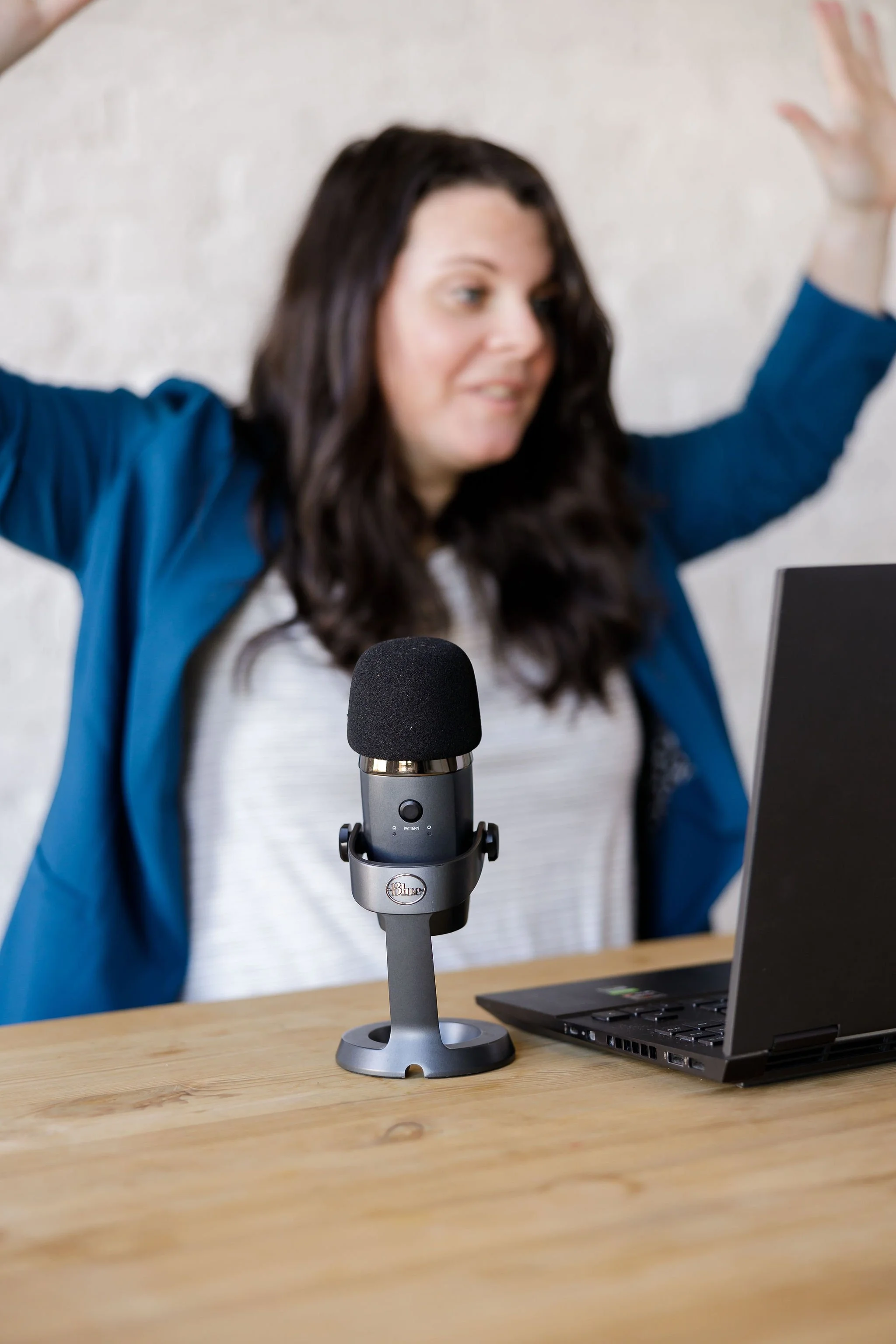Living Small, Dreaming Big: What My 497 Sq. Ft. Studio Taught Me About Burnout-Proof Living
🔥 SMALL SPACE ALERT: I just moved into a 497-square-foot studio apartment. Yes, you read that right—my entire home is smaller than some people's living rooms.
And you know what? I'm freaking LOVING it.
This isn't just another home tour blog (though if you want the full visual experience, check out my YouTube video). This is about something deeper.
Because downsizing my space has been one of the most unexpectedly powerful burnout-prevention moves I've made in years.
Here's why smaller living might be the burnout antidote you never knew you needed—especially if you're an overwhelmed entrepreneur with digital systems that need some serious TLC.
The Unexpected Connection Between Physical Space and Mental Burnout
Let's start with a truth bomb: Your physical environment directly impacts your mental state. This isn't woo-woo stuff—it's neuroscience.
For years, I bought into the "bigger is better" mindset. More space meant more success, right? But what I've discovered after two months in my studio is mind-blowing:
Less space = less mental clutter. When you physically can't accumulate junk, your mind has fewer things to keep track of. It's like forced minimalism for your brain.
Everything needs a purpose. In 497 square feet, every item must earn its place. This "ruthless intentionality" mindset has spilled over into how I run my business—no more "maybe someday" projects collecting digital dust.
Systems become non-negotiable. Small space living requires systems that actually work—not just ones that look pretty. Sound familiar, entrepreneurs?
The Mini-Tour: How My Studio Apartment Works (And Why It Matters for Your Business)
When I moved in, I knew I needed smart systems for my physical space. What I didn't expect was how many business lessons I'd learn along the way.
The Entryway Lesson: First Impressions Matter
My apartment entry is tiny, but it's the first thing I see when I come home. I've made it functional with an Amazon shoe storage unit that holds everything I need. It's not perfect (one piece broke), but it works.
Business translation: Your client onboarding is your business entryway. It doesn't need to be fancy—it needs to be functional. A broken piece doesn't mean the system is worthless.
The Kitchen Lesson: Organize for Daily Use, Not "Someday" Scenarios
My kitchen counters stay uncluttered because I've organized based on what I actually use. Those clear oil/vinegar bottles? I use them more now because they're accessible and visually simple.
Business translation: Stop creating complex systems "just in case." Design for what you do every day, not hypothetical future scenarios. When your tools are accessible and simple, you'll actually use them.
The Living Room Lesson: Multi-Purpose Is the Future
In my studio, my coffee table lifts up for eating, my loveseat defines the space, and everything serves multiple functions.
Business translation: The best business systems are multi-purpose. Your CRM should talk to your email. Your content should feed multiple platforms. Stop building silos and start building ecosystems.
The Bedroom/Office Lesson: Boundaries Create Freedom
Even in an open studio, I've created clear divisions. My Kallax unit separates my bed from my workspace, creating a psychological boundary in a physically boundary-less space.
Business translation: When physical boundaries don't exist (hello, work-from-home entrepreneurs), you must create psychological ones. Your Notion workspace should have clear divisions between projects. Your calendar needs buffer zones. Boundaries don't limit freedom—they create it.
The Digital Decluttering Connection
Here's where it gets interesting for all you digital entrepreneurs feeling overwhelmed with your systems.
Living in a small physical space has taught me that the same principles apply to our digital environments:
Ruthlessly eliminate what doesn't serve you. Just like I can't keep unnecessary physical items, you can't maintain 17 different software tools. Choose what works and cut the rest.
Everything needs a home. In my apartment, keys go on the hook, purse has its spot, glasses have a drawer. In your digital life, client information, content ideas, and project plans need equally clear homes.
Simple systems get used. My bathroom counter stays clear because I've made it easy to keep it that way. Your task management system will only work if it's simple enough to use consistently.
The Real Reason We Struggle With Systems: It's Not What You Think
Moving to a tiny apartment revealed something profound about why so many entrepreneurs struggle with systems, both physical and digital:
We've been taught that more is better. More space. More features. More complexity.
But the truth? Constraint breeds creativity. Limitations force innovation. Simplicity creates consistency.
My 497 sq. ft. apartment has better systems than my previous, much larger place—not despite its size, but because of it.
The same principle applies to your business systems:
Maybe your Notion setup needs fewer databases, not more.
Maybe your content strategy needs more focus, not more platforms.
Maybe your client process needs streamlining, not additional steps.
What if the key to burnout-proof business isn't adding more, but strategically subtracting?
From Physical to Digital: Bringing Small-Space Wisdom to Your Business Systems
Here are three small-space-inspired systems that have revolutionized my business (and might just save yours from burnout):
1. The "One In, One Out" Rule
In my apartment, if I buy a new shirt, an old one has to go. This keeps my closet functional and prevents overwhelm.
Try this with your business: For every new tool, project, or commitment you add, remove one. Adding Slack? Maybe it's time to ditch that Discord group. New client type? Consider sunsetting an old service.
2. The Daily Reset Ritual
In a small space, daily maintenance is essential. I spend 10 minutes each evening resetting my apartment to "home base."
Business application: Create a 10-minute end-of-day digital reset. Close tabs. Clear notifications. Update your task list. This small habit prevents digital clutter from becoming digital burnout.
3. The Visibility System
In my apartment, I keep frequently used items visible and accessible. The rest gets stored away.
For your business systems: Create a dashboard that shows only what you need right now. Not 27 databases—just the projects, metrics, and tasks for this week. Your brain will thank you.
The Burnout Connection: Why Less Really Is More
So what does all this have to do with burnout? Everything.
Burnout happens when your brain can't keep up with the demands placed on it. When your physical and digital environments are cluttered and complex, your cognitive load skyrockets.
Living in a smaller space has forced me to simplify, and that simplicity has given my brain room to breathe. The result? More creativity. More focus. More energy.
And significantly less burnout.
Your Turn: From Overwhelm to Overflow
You don't have to move to a tiny apartment to experience this shift. But you do need to start thinking like someone who lives in a small space:
What in your business doesn't earn its keep? The project management tool you barely use? The social platform that drains you? The overly complex process that made sense on paper but creates friction in practice?
Where could intentional constraints create more freedom? Maybe it's limiting your work hours. Or focusing on fewer content types. Or serving fewer client types, but serving them better.
What would your business look like if it had to fit in 497 square feet? What would stay? What would go?
This isn't about deprivation. It's about curation. And curation is the ultimate burnout prevention strategy.
The Bottom Line: Small Space, Big Impact
My tiny apartment has become more than just a place to live. It's become a template for how I run my business and my life:
With intention, not inertia
With systems, not struggle
With enough, not excess
And that, my friends, is the secret to burnout-proof living, whether you're in 500 square feet or 5,000.
Ready to Downsize Your Digital Overwhelm?
If your business feels like a cluttered, overwhelming space with too many moving parts and not enough peace, let's fix that.
I've got a Burnout-Proof Quiz that will help you identify exactly where your business systems need simplifying. It takes just 3 minutes, and you'll get customized recommendations for creating systems that actually work for YOUR brain.
👉 Take the Burnout Quiz now and start creating more space in your business and life
Your business deserves systems that don't suck. Your brain deserves the mental equivalent of my tidy 497 sq. ft. apartment—everything in its place, nothing that doesn't belong, and plenty of room to breathe.




Stayed up until 2AM, woke at 9:20, Googled one thing—suddenly it's noon. Do you need an ADHD diagnosis to trust your experience? Learn why self-awareness + implementation = power.